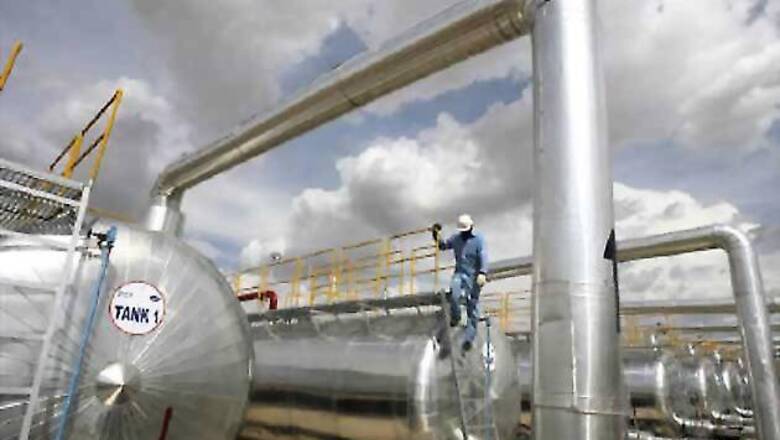
views
Washington: The U.S. government has concluded that nearly half of Iran's monthly earnings from crude oil exports are accumulating in accounts outside the country because of sanctions that restrict Tehran's access to the money.
The estimates, provided to The Associated Press by a senior U.S. official and never released before, are the latest indication that new sanctions imposed in February are deepening Iran's economic distress and making it increasingly difficult to access billions of dollars in vital oil revenues. The official spoke on condition of anonymity because of the sensitivity of sanctions policy.
The U.S. hopes the pressure will force Iran to compromise on its nuclear program, which the West suspects is aimed at making a weapon. Iran insists it is for peaceful purposes only and has not budged on demands to halt uranium enrichment - a process that can be used to make fuel for energy or for a nuclear weapon.
The U.S. government estimates about $1.5 billion of crude oil revenues is piling up in restricted foreign accounts every month now. Crude revenues overall averaged about $3.4 billion monthly in the first half of year, according to the assessment.
This means Iran is not able to either spend or repatriate about 44 percent of its crude oil income.
The February sanctions, which dealt one of the harshest blows to the Iranian economy in recent times, aimed at cutting off access to oil revenues. They require an already reduced pool of oil importers to pay into locked bank accounts that Iran can access only to purchase non-sanctioned goods in that country or humanitarian supplies.
If importers do not comply, they face the threat of being shut out of the U.S. financial system. The U.S. has granted sanctions exemptions to China, India and seven other countries to import Iranian oil. Only six are currently importing oil, according to the government.
The U.S. reached the estimates by looking at Iran's trade imbalances with oil importers based on customs data from each of the relevant countries. The figures show Iran cannot spend the full amount it earns because it is limited to buying only non-sanctioned goods for imports from the small pool of trading partners. And it is not able to repatriate the money to fill its foreign reserve coffers or cover any budget shortfalls.
Garbis Iradian of the Institute of International Finance (IIF), an economic think tank, noted that despite wave after wave of sanctions, Iran continues to run a trade surplus. But that surplus has been steadily shrinking since 2011. The assets piling up abroad could render most of that remaining surplus essentially unusable.
"This is a major development," Iradian said. "If they don't have access to this, it is an additional burden and if that continues on, they will feel the pain," he added. "It seems the sanctions intensified with this accessibility issue."
Iradian, the deputy director of IIF's Africa and Middle East Department, said Iran's total trade surplus has fallen from about $70 billion in 2011 to about $44 billion in 2012. IIF estimates it will reach about $38 billion by the end of this year. And with $1.5 billion a month accumulating in restricted accounts, some $15 billion of the $38 billion surplus may be out of reach.
"This brings down their trade surplus to almost zero," said Iradian. "That is quite severe. They are entering a dangerous zone."
The official also disclosed a previously unreleased U.S. government estimate that crude oil revenues have fallen 58 percent since late 2011 because of sanctions. The revenues averaged an estimated $8 billion per month in the first half of 2011, then fell to $6.3 billion in the first half of 2012 and an estimated $3.4 billion monthly in the first half of 2013, according to the assessment.
Iran was exporting about 2.5 million barrels per day at the end of 2011 and is now believed to be exporting about 1 million. Iradian said the price of oil averaged about $107 per barrel for the first half of the year but spiked in recent days over growing tensions in Syria, Iran's closest ally in the Arab world.
The steep drop in oil exports is not the only indication of the heavy toll sanctions have taken on Iran's economy over the past two years. The local rial currency lost two-thirds of its value since late 2011 and inflation has surged.
Since the election of new president Hasan Rouhani in June, there have been a number of indications the distress is deepening. Local news reports say Tehran may come up short of revenue to cover this year's budget. And an Iranian official said recently that more than $60 billion of the country's oil revenue is frozen in foreign banks and out of reach.
Still, analysts say Iran's economy has proved resilient and flexible enough to offset some sanctions damage. The country has diversified its exports and become less reliant on sanctioned oil.
Mark Dubowitz, director of the Foundation for Defense of Democracies and an advocate of tougher sanctions who has testified before Congress, said Iran can muddle through economically for a few more years. And some experts have concluded Iran could produce enough material to build a nuclear weapon by mid-2014.
"Without massively intensified economic pressure and a real threat of military force, Iranian nuclear physics will continue to outpace Western economic pressure and diplomacy," Dubowitz said.


















Comments
0 comment